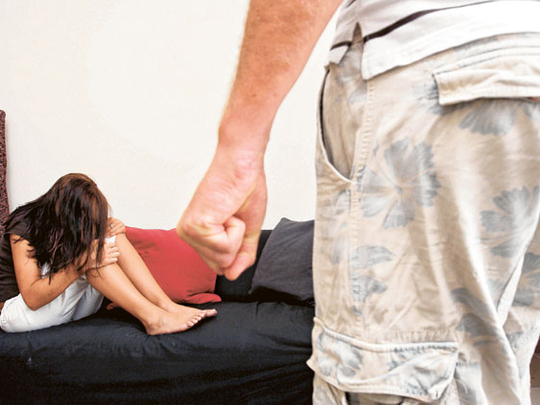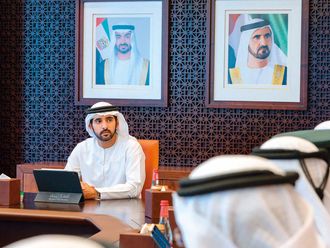
Dubai: Around the world, one in three women may be raped, beaten, or abused during their lifetime. And the majority of these offences will be committed by a family member.
Once domestic violence invades a home, it leaves long-term effects: Long-term physical and emotional scarring.
But while domestic violence mostly affects husband-wife relationships, it is not just restricted to married couples.
"It [domestic violence] has nothing to do with the marriage licence," Dr Raymond Hamden, a clinical and forensic psychologist who specialises in treating domestic violence victims in Dubai, told Gulf News. "It can be people who are roommates, housemates — it can be people who are in a non-romantic relationship."
The majority of patients Hamden sees are women, but men are being victimised too.
"Men also are being abused," Hamden said. "The reason you don't see the statistics reflecting it is it's not very macho for a man to admit that his wife beats him up."
In 2007, a Ras Al Khaimah court sentenced a Kazakh woman to three months in prison with 80 lashes, fined her Dh1,000, and deported her after she beat her husband.
Physical violence is the most obvious form as the bruises speak for themselves. But domestic violence disguises itself in many forms.
"It can actually be yelling, screaming, name-calling, throwing things, hitting, guns or knives, or the threat of any of those; [that's] emotional abuse, verbal abuse," Hamden said.
"There's also economic abuse where you're withholding funds to control a person's ability to manoeuvre outside of the relationship or the home," he added. "And the social abuse is when you're controlling whom that individual will socialise with."
Those that don't leave visible scars are the ones that are actually more damaging, said Dr Fekreya Arjamand, psychological services manager at the Dubai Foundation for Women and Children (DFWAC), the first licensed, non-profit shelter in the country for women and child victims of domestic violence, human trafficking and child abuse.
"Emotional damage is more severe than the physical. A person can spit on another person; there are no bruises but imagine how much psychological damage [that] can have," Arjamand said, adding many victims who suffer abuse suffer in silence.
Social stigma
Another quietly suffered type of violence is sexual abuse, which happens even in marriage when one partner insists on having sex while the other does not want to.
"They [married couples] use this a lot of times in the name of religion, which is not true. It should be a mutual relationship," Arjamand said.
Many victims stay in abusive relationships for the sake of their children, fear, economic reasons, or because of the social stigma attached to separation.
Many of them also hope that change will come in the long run. That, unfortunately, doesn't happen.
The abuse only repeats in a cycle.
"We call it the honeymoon cycle. [He'll say,] ‘No honey, I'm sorry I will not do this again…' Tomorrow he'll give her flowers, for example, and then that cycle will happen over and over," Arjamand said.
This stark reality happens in every society including the UAE. However, there are no available nationwide statistics on domestic violence.
"[In Dubai], usually it's among different nationalities [but] it's hard to say which population has more than the other," Arjamand said.
In its latest annual report, DFWAC has helped 512 clients since it opened in 2007. It said that in 2010, the centre received 294 clients — almost half were victims of domestic violence.
"They can be Indians, British, German, Asian, Filipino, it depends. Regarding the UAE nationality, we have very few cases," Arjamand said.
But domestic violence cannot be blamed on race or nationality, Hamden stressed.
"Of the abusers, we find that 66 per cent were themselves abused, or were privy to abusive behaviour in their home," he said, adding that abusers are typically those who have poor impulse control, low self-esteem, and are emotionally dependent. "There is no such thing as any law, religious or civil, that permits violence against any other human being," he said.
Great strides
Domestic violence is also tolerated nowhere in the Quran, said Ustadz Amir Daham, an Islamic religious leader at the Abu Bakr Al Seddiqi Islamic Centre.
In fact, the Prophet Mohammad (PBUH) was very clear even regarding corporal punishment among children only as a means to "make them fear your authority and obey your command, but not as punishment", Daham said.
"[The Quran] says that if your wife commits a sin, you should not focus on it. Instead think of the 100 other good deeds she has done. But still strive to correct the mistake," he said.
In 2010, the UAE Federal Supreme Court upheld a husband's right to "chastise" his wife and children by physical force, provided that the husband does not leave any physical marks.
The UAE has taken great strides in campaigning for women's rights, said Fawzia Taresh, director of the Family Development Department of the Ministry of Social Affairs. Social organisations, including the ministry's programmes for empowering women, have been put in place to help women.
"For the past seven or eight years, social organisations have been working towards increasing the awareness of women so when they're subjected to violence, they can approach these institutions," Fawzia said. "I'd like to say that the UAE society is becoming a progressive society. There is this understanding that we should give the woman her rights and opportunities."
But it's not only one aspect of society that should act, Arjamand said. "We can stop the violence by having more evidence-based policies and research, and also doing a thorough evaluation assessment before we give the counselling to the counsellors," Arjamand said.
"Everybody needs to work together — the foundation, the police department, social workers, courts, the government law, the schools, the counsellor, we should all put our hands together in order to [attain a community free of violence] for the future."












